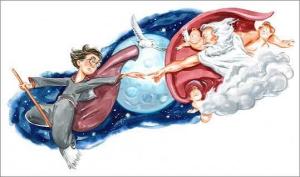By Willa A. Cmiel
I would claim to be a part of the original Harry Potter generation. The series starts near Harry’s eleventh birthday, and the first book came out in 1997 when I was eleven years old. Although “too old” for children’s books now (I still read Alice in Wonderland, often), I grew up with Harry. I was with him from the very start. At this point, though, Harry Potter belongs to no generation, as much as he belongs to no one culture or country or group of people. (I suppose, in fact, since I am American and not British, technicality would omit me from inclusion into HP Gen-A, if there were such a thing). Indeed, the books and their meaning belong to everyone, and everything else is a technicality.
Over the years the books have, of course, been widely challenged, most often by religious organizations for the series’ use of magic and interest in the occult. While Scholars have often touted the books’ connections to oppression, love, the abuse of power, and fundamentalism, it appears that the priests, zealots, and fanatics are coming around. According to the recent Boston Globe article, The Book of Harry, religious critics and scholars are beginning to see a “deeper meaning” in the Boy Wizard:
But over the last several years, religion writers and thinkers have warmed to Harry – both Christianity Today, the evangelical magazine, and L’Osservatore Romano, the Vatican newspaper, have praised the latest film. The Christian Broadcasting Network, home of Pat Robertson, now features on its website a special section on “The Harry Potter Controversy,” with the acknowledgment, “Leading Christian thinkers have disparate views on the Harry Potter products, and how Christians should respond to them.”
Yes!
At the same time, scholars of religion have begun developing a more nuanced take on the Potter phenomenon…The scholars are primarily interested in what the books have to say about the two big issues that always preoccupy people of faith – morality and mortality – but some are also interested in what the series has to say about tolerance (Harry and friends are notably open to people and creatures who differ from them) and bullying, the nature and presence of evil in society, and the existence of the supernatural.
And it is here that the original religious claims against the books shows their weakness. These “religious” themes-morality and mortality, tolerance and bullying, evil, and the supernatural (ghosts and goblins and Moaning Myrtles)–aren’t purely tied to religion. Such are the concerns of all mortals! And Rowling’s series is basically concerned, as most children’s stories are, with goodness, decency, and acceptance. As the article continues, though, it becomes clear that the perceived deeper meaning religion has found in these books is more specific.
(**SPOILER ALERT**)
Where the former critics begin is at the end of the final book in which Harry dies (willingly), only to rise again. Now – because suddenly the Boy Wizard is also Christ – the hang ups with cauldrons, wands, and devil-worship seem insignificant. (Behold, there is something else children’s stories often teach: Patience is a virtue.):
At the end of the last book, we have a dying and rising Potter – he has to be killed to deliver the world from the evil personified by Voldemort,” says Paul V.M. Flesher, director of the religious studies program at the University of Wyoming and the author of an article about Harry Potter for the Journal of Religion and Film. “There’s a Christian pattern to this story. It’s not just good versus evil. Rowling is not being evangelistic – this is not C.S. Lewis – but she knows these stories, and it’s clear she’s fitting pieces together in a way that makes sense and she knows her readers will follow.
Rowling claims the religious connections have always been there, but maintains that her books are ultimately about death, or the ubiquitous fear it plants Western psyches. “[My books] open with the death of Harry’s parents,” Rowling said in an interview with the Telegraph in 2006, “There is Voldemort’s obsession with conquering death and his quest for immortality at any price, the goal of anyone with magic. I so understand why Voldemort wants to conquer death. We’re all frightened of it.”
The greatness of these books (and that which makes them so accessible) is the fact that the issues Harry and his comrades face are so concurrent with our own timeless concerns; whether those concerns happen to be political, personal or religious, is, like the question of membership, a technicality.


No comments